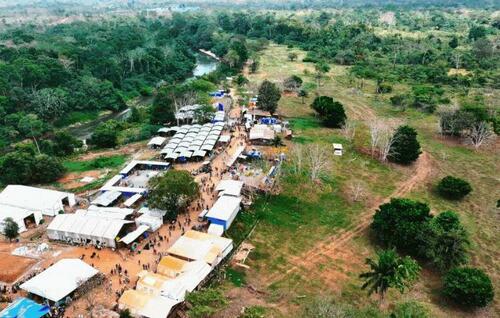Developing countries will be the most severely affected by accelerating climate change and, even excluding China from the calculation, are likely to emit more than half the annual global total of greenhouse gas (GHG) emissions as early as 2030. But the international community has not focused sufficiently on the range of development, adaptation, and resilience priorities and constraints these countries face in tackling the world’s interwoven emissions mitigation imperative.
In an effort to help shift the global policy frame toward the crucial perspectives of developing countries themselves, we recently published an edited volume, Keys to climate action: How developing countries could drive global success and local prosperity. Within the volume, a wide range of distinguished contributors present both country case studies (on Bangladesh, Egypt, India, Indonesia, Nigeria, and South Africa) and wider geography-focused assessments (on East Africa, Africa as a whole, Latin America and the Caribbean, and the V20 group of vulnerable countries), in addition to an assessment of the overarching financing challenges.
As a collection, these studies describe how climate change is hindering local development efforts while also providing new opportunities. They draw attention to the vital importance of elevating developing country perspectives in driving global climate action. They also offer central insights on the diverse and evolving issues that need to be front-of-mind when considering the relevant challenges.
Range of circumstances
Developing countries should not be considered as a monolithic group. They have different though overlapping interests, given their circumstances. Small islands, for example, have temporarily responded to natural disasters by borrowing to rebuild and protect the livelihoods of their citizens, but as the scale and intensity of climate change accelerates, their fiscal flexibility is fast eroding.
Other countries remain concerned that embarking on an energy transition will impede their overall economic growth and hard-won progress in tackling food security, education, health, and other elements of sustainable development. The political economy of transition to a low-carbon economy can be daunting. Vested interests in coal and fossil-fuel industries can be strong. Geographic imbalances between winners and losers complicate the politics of change.
Evolving perspectives
Nonetheless, the case studies suggest that attitudes and official positions are evolving. There is a new understanding that an integrated climate-and-development program can simultaneously speed up development and lower GHG emissions if implemented at scale. Investment and innovations in adaptation, resilience, nature, and emissions mitigation can be in each country’s national self-interest if they boost economic growth while providing cheaper and more inclusive access to modern energy. Such a strategy avoids the penalties of trade tariffs in a world with carbon border tax adjustments. It is creating excitement over new opportunities for developing countries to provide credits that can be sold in voluntary and compliance-based carbon markets in advanced economies. It could allow them to participate in new technologies such as green hydrogen.
Domestic policy challenges
Seizing these opportunities requires strong institutions and robust national policy systems. Governments at national and sub-national levels must manage here-and-now costs already hurting their people and economies while also organizing and delivering toward a comprehensive energy transition. This transition is remarkably complex. In addition to innovations in new technologies, transitions must be designed and viewed through a lens of justice—between countries, across geographies within countries, across workers, across generations, and across gender gaps.
The global financing challenge
The case studies also draw attention to the huge challenge of finance—which we dub a “broken thread” of the international system.
The case studies also draw attention to the huge challenge of finance—which we dub a “broken thread” of the international system. Most developing countries must rely on international finance to supplement their own resources, but there is far too little available. There is not enough concessional finance, which is critical for loss and damage, for meeting the costs of just transitions, and for adaptation where projects do not generate direct revenues. Nor is there enough non-concessional public finance. Private finance has a major role to play but can be too expensive and volatile for many of the needed investments.
Recent granular assessments of climate finance needs suggest that emerging markets and developing countries other than China will need to increase climate spending to around $2.4 trillion per year by 2030—more than four times the current level—of which $1 trillion would need to come from external sources. This is an order of magnitude greater than the initial commitment made by advanced economies in Copenhagen in 2009 to provide $100 billion in additional climate finance to developing countries by 2020, a pledge that has still not been met. Our volume’s bottom-up case studies corroborate the major gaps in the global financial architecture, and a gap in the process of coordinating finance from different sources.
All of this leads to a prominent role for multilateral development banks (MDBs) and development finance more broadly. The MDBs could help countries to set out and implement ambitious climate and sustainable development strategies, tackle policy and institutional gaps that impede the scaling-up of investments, mobilize more affordable private capital, ramp up their own financing for critical public investment needs, and assist countries in coordinating multiple stakeholders behind a coherent vision and strategy. To do all of this would make them into quite different organizations from what they are today.
Four key ingredients for progress
What can be done to trigger progress on such a large, crucial, and complex set of global challenges? In our overview chapter for the volume, we identify four key ingredients to help drive successful action and outcomes.
- Developing countries should help set the international agenda. Developing countries need to join forces on their international “asks,” not only for adaptation and resilience, on which they have been increasingly successful, but also on mitigation, for which differences in self-interest often still prevail. This is important for overcoming shortfalls in understanding within international climate and development negotiations of the major priorities faced by developing countries in articulating and implementing integrated climate-and-development strategies. For example, an advanced economy lens focused narrowly on mitigation is not helpful in creating ownership for climate action in developing countries, nor are processes that keep climate and development on separate negotiating tracks.
- Country-by-country planning and consensus building is foundational. Developing countries need to undertake the detailed work of identifying long-term strategies and projects to tackle their own integrated climate and development challenge. They require processes for civic participation that could become a basis for creating broad popular endorsement of a new strategy. The “just energy transition partnerships” described in some of our volume’s case studies provide an understanding of how to map and navigate relevant political economy issues, even if they are still works in progress.
- Financing is essential. Multiple types of finance need to be scaled up, with the mix varying by country and project type. Rich countries should double their climate finance commitment by 2025 and enhance its effectiveness, while the international community should pursue all avenues to scale up the availability of low-cost finance. Interest rates and maturities, uncertainties of terms, and ability of developing countries to access fragmented sources of finance all need to be addressed. The case studies put forward several targeted ideas on actions that could be taken. A reformed multilateral development bank system is a recurring urgent theme.
- A focus on building trust. Developing countries can press advanced economies to take proactive steps to rebuild confidence in international cooperation. This is important both for fostering political collaboration and mitigating technical risks. Strategies for making faster progress on both climate and economic development challenges have two important features that cut across countries. They have greater risks in the short run from the added financial exposure, but they have greater benefits when everyone moves in the same direction. If everyone trusts others to do their part, the risks of being a “first mover” can be reduced. For their own part, developing countries can help rebuild the spirit of global solutions to global problems by refining their ambitions of what exactly they will take on in the presence of greater support from the international community.
Looking ahead
However helpful this edited volume turns out to be, Keys to Climate Action amounts to only one undertaking aiming to elevate developing country perspectives in advancing a new reference point for the world’s central climate and development challenges. Further efforts are needed to refine and advance the relevant issues in the lead-up to major events like the G-20 summits (hosted by India in 2023 and Brazil in 2024), the COP28 climate summit (hosted by United Arab Emirates in 2023), and around the growing calls for reform of the World Bank and related institutions. With a sustained push of collective energy and attention, emergent insights and institutional innovations can help drive a new era of widespread prosperity for all.
















